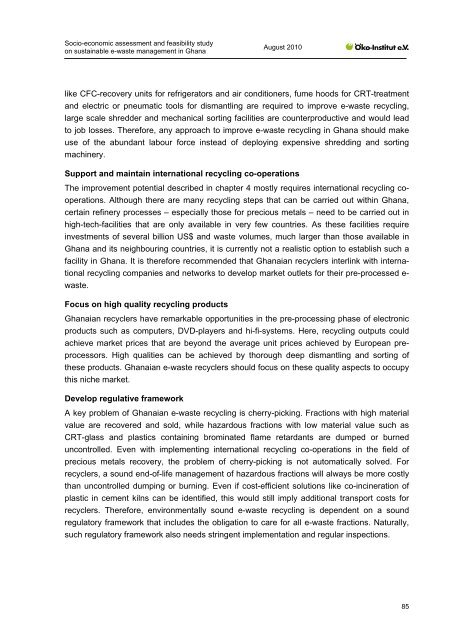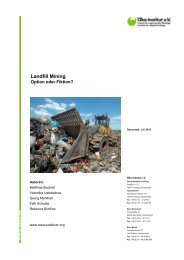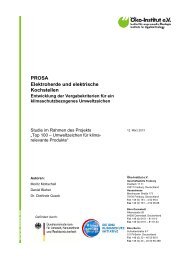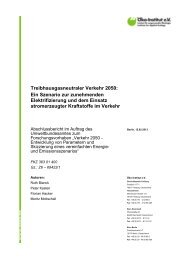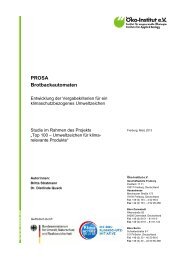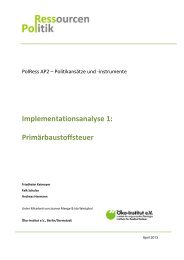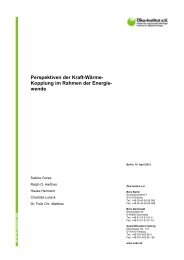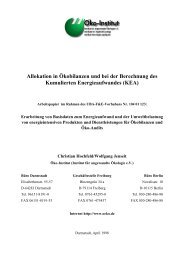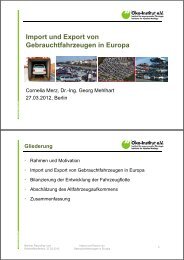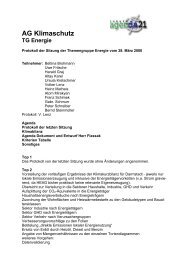Socio-economic assessment and feasibility study on - Öko-Institut eV
Socio-economic assessment and feasibility study on - Öko-Institut eV
Socio-economic assessment and feasibility study on - Öko-Institut eV
Create successful ePaper yourself
Turn your PDF publications into a flip-book with our unique Google optimized e-Paper software.
<str<strong>on</strong>g>Socio</str<strong>on</strong>g>-<str<strong>on</strong>g>ec<strong>on</strong>omic</str<strong>on</strong>g> <str<strong>on</strong>g>assessment</str<strong>on</strong>g> <str<strong>on</strong>g>and</str<strong>on</strong>g> <str<strong>on</strong>g>feasibility</str<strong>on</strong>g> <str<strong>on</strong>g>study</str<strong>on</strong>g><br />
<strong>on</strong> sustainable e-waste management in Ghana<br />
August 2010<br />
like CFC-recovery units for refrigerators <str<strong>on</strong>g>and</str<strong>on</strong>g> air c<strong>on</strong>diti<strong>on</strong>ers, fume hoods for CRT-treatment<br />
<str<strong>on</strong>g>and</str<strong>on</strong>g> electric or pneumatic tools for dismantling are required to improve e-waste recycling,<br />
large scale shredder <str<strong>on</strong>g>and</str<strong>on</strong>g> mechanical sorting facilities are counterproductive <str<strong>on</strong>g>and</str<strong>on</strong>g> would lead<br />
to job losses. Therefore, any approach to improve e-waste recycling in Ghana should make<br />
use of the abundant labour force instead of deploying expensive shredding <str<strong>on</strong>g>and</str<strong>on</strong>g> sorting<br />
machinery.<br />
Support <str<strong>on</strong>g>and</str<strong>on</strong>g> maintain internati<strong>on</strong>al recycling co-operati<strong>on</strong>s<br />
The improvement potential described in chapter 4 mostly requires internati<strong>on</strong>al recycling cooperati<strong>on</strong>s.<br />
Although there are many recycling steps that can be carried out within Ghana,<br />
certain refinery processes – especially those for precious metals – need to be carried out in<br />
high-tech-facilities that are <strong>on</strong>ly available in very few countries. As these facilities require<br />
investments of several billi<strong>on</strong> US$ <str<strong>on</strong>g>and</str<strong>on</strong>g> waste volumes, much larger than those available in<br />
Ghana <str<strong>on</strong>g>and</str<strong>on</strong>g> its neighbouring countries, it is currently not a realistic opti<strong>on</strong> to establish such a<br />
facility in Ghana. It is therefore recommended that Ghanaian recyclers interlink with internati<strong>on</strong>al<br />
recycling companies <str<strong>on</strong>g>and</str<strong>on</strong>g> networks to develop market outlets for their pre-processed ewaste.<br />
Focus <strong>on</strong> high quality recycling products<br />
Ghanaian recyclers have remarkable opportunities in the pre-processing phase of electr<strong>on</strong>ic<br />
products such as computers, DVD-players <str<strong>on</strong>g>and</str<strong>on</strong>g> hi-fi-systems. Here, recycling outputs could<br />
achieve market prices that are bey<strong>on</strong>d the average unit prices achieved by European preprocessors.<br />
High qualities can be achieved by thorough deep dismantling <str<strong>on</strong>g>and</str<strong>on</strong>g> sorting of<br />
these products. Ghanaian e-waste recyclers should focus <strong>on</strong> these quality aspects to occupy<br />
this niche market.<br />
Develop regulative framework<br />
A key problem of Ghanaian e-waste recycling is cherry-picking. Fracti<strong>on</strong>s with high material<br />
value are recovered <str<strong>on</strong>g>and</str<strong>on</strong>g> sold, while hazardous fracti<strong>on</strong>s with low material value such as<br />
CRT-glass <str<strong>on</strong>g>and</str<strong>on</strong>g> plastics c<strong>on</strong>taining brominated flame retardants are dumped or burned<br />
unc<strong>on</strong>trolled. Even with implementing internati<strong>on</strong>al recycling co-operati<strong>on</strong>s in the field of<br />
precious metals recovery, the problem of cherry-picking is not automatically solved. For<br />
recyclers, a sound end-of-life management of hazardous fracti<strong>on</strong>s will always be more costly<br />
than unc<strong>on</strong>trolled dumping or burning. Even if cost-efficient soluti<strong>on</strong>s like co-incinerati<strong>on</strong> of<br />
plastic in cement kilns can be identified, this would still imply additi<strong>on</strong>al transport costs for<br />
recyclers. Therefore, envir<strong>on</strong>mentally sound e-waste recycling is dependent <strong>on</strong> a sound<br />
regulatory framework that includes the obligati<strong>on</strong> to care for all e-waste fracti<strong>on</strong>s. Naturally,<br />
such regulatory framework also needs stringent implementati<strong>on</strong> <str<strong>on</strong>g>and</str<strong>on</strong>g> regular inspecti<strong>on</strong>s.<br />
85


